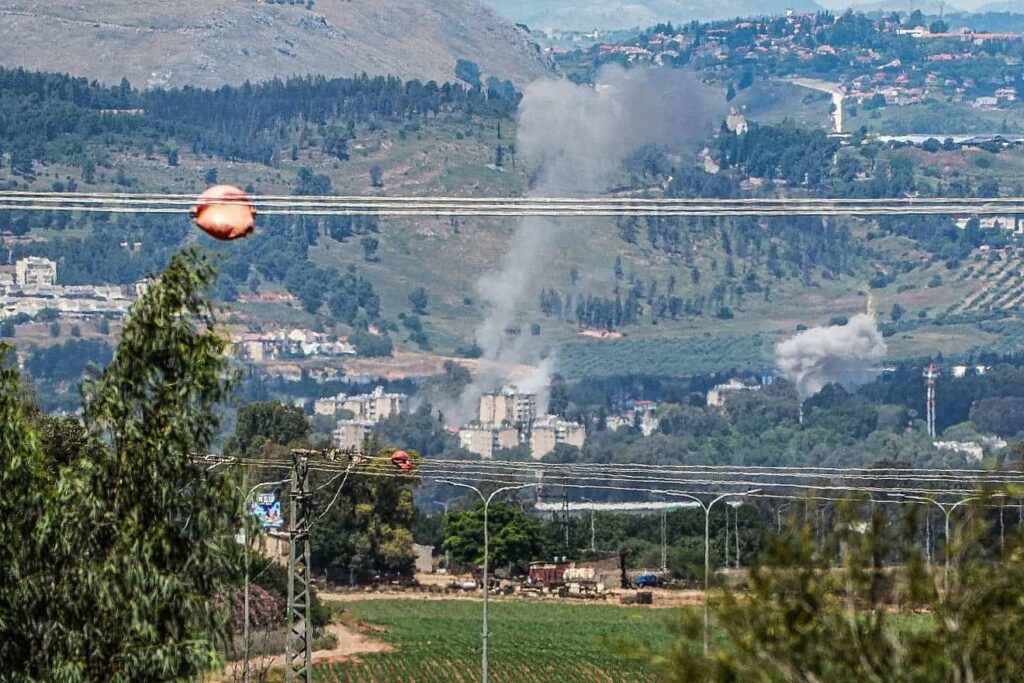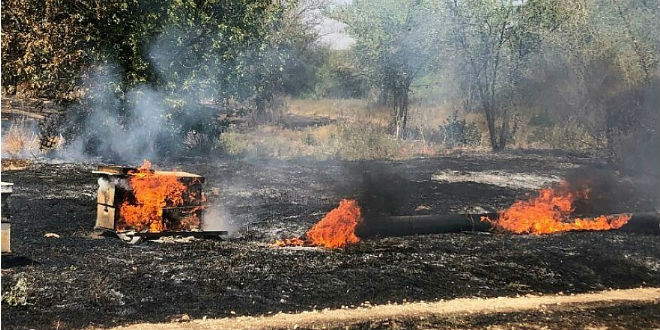In the picturesque landscape of Israel’s Galilee, where the soothing hum of our Neshikha beehives now mingles with the buzz of Air Force drones and echoes of distant aerial and artillery cross-border warfare, a recent quotidian journey to the annual beekeepers’ conference at the Volcani Agricultural Institute in Rehovot, in the country’s center turned into an unexpected snapshot of Israel at war.
As we traveled southwards through spitting rain and early morning wraiths of fog, our focus was split between the anticipation of gaining insights into beekeeping and the somber radio reports of 21 IDF soldiers killed overnight in the ongoing Gaza fighting. The weight of the news was palpable in the hall as we arrived at the conference, where the agricultural community gathered to discuss honey production, beekeeping techniques, and related fields.
Our early departure spared us the initial morning sessions and kept us from an incoming rocket barrage directed at the IDF’s Air Traffic Control center atop Mt. Meron, a mere 10-minute drive from the safety of our cottage’s reinforced “safe room.” The now near-daily rocket fire alerts are a bracing reality for those of us living in the shadow of Iranian-backed Hezbollah terrorists in southern Lebanon – along with some 80k displaced Israelis forced to find housing beyond the stipulated five-kilometer security perimeter.
The targets of these attacks weren’t just military; they included our neighbors’ children attending school at and in the vicinity of the Upper Galilee Regional Council. The resilience of these young minds, forced to confront the threat of rocket attacks as part of their daily lives, is remarkable. It starkly contrasts the seemingly trivial disruptions of a typical school day, a bit more harrowing than pulling a fire alarm to escape class.

The terrorists, calculating in their ruthlessness, know precisely where to aim for maximum impact, using drones and binoculars to target school buses and populated areas. Thankfully, on this particular morning, their murderous intent did not succeed.
Beyond the immediate danger, however, some of these kids grapple with severe post-traumatic stress disorder, worry for family members serving on both fronts, attend funerals of friends and family lost in the war, and visit those scarred by the ongoing fighting.
The multiple volleys of rockets added a layer of complexity to an already tumultuous day. Sitting on the floor at the back of the hall, I alternately glanced up at PowerPoint slides on strategies for stemming varroa mite beehive infestations and sought the latest Telegram channel updates on terrorist infestations plaguing the larger hive of northern Israeli lives.
Conflicting reports emerged, with some suggesting hits on the structures, while the army insisted on the continued functionality of the facility. The dichotomy of agricultural discussions and the ever-present threat of rockets underscored the intricate tapestry of daily life in wartime Israel.
Back at the beekeepers’ conference, the atmosphere was an informal mix of sweatshirt-and-jeans-garbed beekeepers, entomologists, agronomists, and farmers passionately exchanging notes and arguments over beekeeping minutia. The rugged salt-of-the-earth Israelis, armed with knowledge about crop yields and pollination and personal weapons for self-defense, created a scene of resilience and practicality in the face of adversity.

The uniformed community security team members and those residing in rural border areas added another layer to the gathering. These were individuals accustomed to carrying weapons for personal safety, particularly during heightened tension. Weapons and pistols, including a double-clipped AR-4 strapped to the back of a camo-garbed lecturer, were a visual testament to the stark reality that accompanies their pursuit of agricultural knowledge around here.
One surreal moment came when the Red Alert cell phone alarms started buzzing (sorry) during the rocket attack. The typically unflappable farmers – from all over the country, including the Gaza Perimeter region and northern border communities – were, like a beehive, threatened by outside intruders on the home front, responding practically as one: they grabbed their cellphones, practically in unison. The urgency to send messages to loved ones under fire transformed the hall, typically buzzing with beekeeping discussions, into a hive of human connection and shared concern.
Early on in the conference, a technical slide showcased a photo of a researcher from Kfar Aza, tragically killed on October 7th. This poignant moment served as a stark reminder that amidst the pursuit of agricultural advancements, lives here are deeply intertwined with the broader context of the Israeli-Arab conflict.
In conclusion, the beekeepers’ conference in wartime Israel isn’t just a gathering of experts; it’s a narrative of resilience, connectivity, and the intricate balance between daily life and ongoing threats. The threads of danger, unity, and shared purpose wove together to form a tapestry that captures the essence of life in a conflict-stricken region.
—
The US-born author is a four-decade Israeli oleh, and is active on his Galilee village and regional Tzah”i community resilience/first-responders team. The past AP-award-winning NPR bureau chief and local “ever-recovering reporter” and photo-videographer would just as soon be beekeeping with his wife, and enjoying his kids and grandkids. His new page is growing here: http://tinyurl.com/CompellingPhotography
As appeared in The Jerusalem Post print edition, 01-02-2024: ’‘War and Bees’: Honey and the Sting’:






